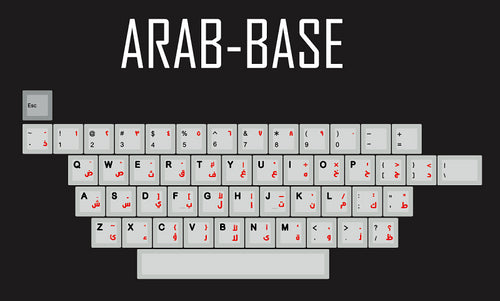


kprepublic 139 Arabic language root font letter Cherry profile Dye Sub Keycap PBT for gh60 xd60 xd84 cospad tada68 87 104 fc660
$17.30 $17.30

139 PBT Keycaps(A product by KPrepublic)
Compatible with Cherry MX switches and related clones, these keycaps are made of super-durable PBT plastic. They’re designed in Cherry profile for kinds of keyboards(such as XD64\GH60\RS96\Tada68.......), and they’re finished with dye-sublimated legends. Total comes with max 139 keycaps
(Base+Mod+Pro+Num+Space)
Specs
PBT plastic
Thick PBT
Shading Light Keycaps
Dye sublimation legends
Color: Familar with DSA Grinate or XDA Milestone, so the Alpha kit color is light white grey:)
Compatible with MX switches (and clones)
Cherry profile
3U/6U/625U/7U are Convex Spacebar
layout is as following pic
Included
Max 139 Keys(Base+Mod+Pro+Num+Space)
Arabic (Arabic: العَرَبِيَّة) al-ʻarabiyyah [ʔalʕaraˈbijːah] (About this sound listen) or (Arabic: عَرَبِيّ) ʻarabī [ˈʕarabiː] (About this sound listen) or [ʕaraˈbij]) is a Central Semitic language that first emerged in Iron Age northwestern Arabia and is now the lingua franca of the Arab world.It is named after the Arabs, a term initially used to describe peoples living from Mesopotamia in the east to the Anti-Lebanon mountains in the west, in northwestern Arabia, and in the Sinai peninsula. Arabic is classified as a macrolanguage comprising 30 modern varieties, including its standard form (Modern Standard Arabic).
The modern written language (Modern Standard Arabic) is derived from Classical Arabic. It is widely taught in schools and universities, and is used to varying degrees in workplaces, government, and the media. The two formal varieties are grouped together as Literary Arabic (fuṣḥā), which is the official language of 26 states and the liturgical language of Islam. Modern Standard Arabic largely follows the grammatical standards of Classical Arabic and uses much of the same vocabulary. However, it has discarded some grammatical constructions and vocabulary that no longer have any counterpart in the spoken varieties, and has adopted certain new constructions and vocabulary from the spoken varieties. Much of the new vocabulary is used to denote concepts that have arisen in the post-classical era, especially in modern times.
During the Middle Ages, Literary Arabic was a major vehicle of culture in Europe, especially in science, mathematics and philosophy. As a result, many European languages have also borrowed many words from it. Arabic influence, mainly in vocabulary, is seen in European languages, mainly Spanish and to a lesser extent Portuguese, Valencian and Catalan, owing to both the proximity of Christian European and Muslim Arab civilizations and 800 years of Arabic culture and language in the Iberian Peninsula, referred to in Arabic as al-Andalus. Sicilian has about 500 Arabic words as result of Sicily being progressively conquered by Arabs from North Africa, from the mid 9th to mid 10th centuries. Many of these words relate to agriculture and related activities (Hull and Ruffino). Balkan languages, including Greek and Bulgarian, have also acquired a significant number of Arabic words through contact with Ottoman Turkish.
Arabic has influenced many languages around the globe throughout its history. Some of the most influenced languages are Persian, Turkish, Spanish, Urdu, Kashmiri, Kurdish, Bosnian, Kazakh, Bengali, Hindi, Malay, Maldivian, Indonesian, Pashto, Punjabi, Tagalog, Sindhi and Hausa and some languages in parts of Africa. Conversely, Arabic has borrowed words from other languages including Greek and Persian in medieval times, and contemporary European languages such as English and French in modern times.
Classical Arabic is the liturgical language of 1.8 billion Muslims and Modern Standard Arabic is one of six official languages of the United Nations. All varieties of Arabic combined are spoken by perhaps as many as 422 million speakers (native and non-native) in the Arab world,making it the fifth most spoken language in the world. Arabic is written with the Arabic alphabet, which is an abjad script and is written from right to left, although the spoken varieties are sometimes written in ASCII Latin from left to right with no standardized orthography.